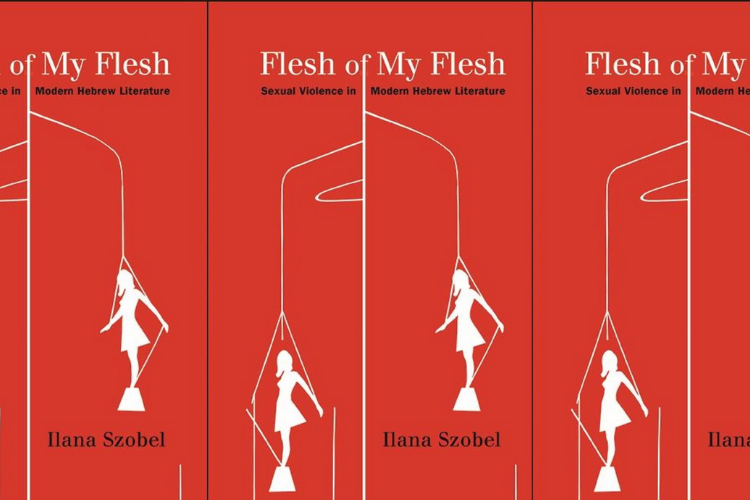
“Flesh of My Flesh” – An Examination of Sexual Violence in Hebrew Literature
A good academic book does more than present information – it prickles, it disturbs what we already know, or believe we know. In her book, Flesh of My Flesh: Sexual Violence in Modern Hebrew Literature (State University of New York Press, $95.00 hardcover, $24.99 NOOK), Ilana Szobel examines Israeli fiction, non-fiction and poetry beginning with the pre-Yishuv period to work published in the country in the last two decades. (Unless you’re a true Israeli literature nerd—and maybe even if you are—you’ve likely not known many of the referenced texts, most of which haven’t been translated into English.)
Szobel confesses that she expected to encounter “nothing but conservatism” about sexual violence in her tour through the early Twentieth Century, but found herself surprised when she read the work of male writers who admitted to anxiety about the new expectations Judaism and Zionism placed on their masculinity, writing in their fiction about encounters with sex workers.
With her exploration of the work of Shoshana Shababo (born in 1910 in Zichron Yaakov), the first Sephardic Israel female writer, Szobel brings us squarely into an intersectional space. You’d be correct if you were assuming there’s an intentional amnesia in Israel both around women’s literature and around sexual assault.
Shababo, whose identity is not based in the actual or metaphoric experience of exile, depicts Middle Eastern and Sephardi women in her fiction. While these women don’t express uneasiness about belonging in Israeli society (contrary to the Ashkenazi narrative brought to light by many male writers), their experience of sexual violence is depicted as part of being a marginalized gender, and a marginalized ethnicity. Writes Szobel, “…Sexual violence in the prism through which Shababo looks at her Sephardi community; it is used as a litmus test to examine the norms, traditions, and ideologies that make up her subjectivity.”
Perhaps it’s needless to say that Shababo’s attention to these subjects, in addition to the portrayal of female sexuality as being autonomous and independent of men, was not well received by reviewers at the time.
As the book marches on, Szobel highlights the continual exclusion of particular identities when it comes to writing about sexual assault. Her claim is that contemporary Hebrew literature omits the voices of the young, queer, Palestinian, and poor, to name a few. While the disabled body does factor into the literature, it’s often in the context of heterosexuality fantasy.
To paint a clearer picture of the role of sexual assault, Szobel turns to Shababo’s work again. What happens to her characters, Szobel notes, is not up for debate. There’s no unnecessary subtlety—while the male writers mentioned above all relied on metaphor when talking about sexual assault.
In the current moment, Szobel points out, Hebrew literature still has a collective mental block against writing about sexual assault, and along with that, essays written about it from a survivor, as well as a psychological point of view, promote emotional distance from the assault, and anything that doesn’t scream “positivity” and conventional representations of “moving forward.” “…contemporary Hebrew literature simply cannot cope with helplessness and hopelessness,” says Szobel.”
Paraphrasing the philosopher Susan Brison, she writes: “…shame, guilt, and the feeling that if you had done something differently you might have prevented the sexual assault, are easier to accept and understand than living with the recognition that the assault was arbitrary, unpredictable, and independent of you or your behavior, and as such, it is an experience that might happen again at any given moment.” Szobel continues: “In the case of Hebrew literature, focusing on the narrative of the “survivors” rather than the “victims” (an accurate term that seemingly strips agency and empowerment from those who have experienced the trauma) is more comforting than living with the terror of the uncontrollable.”
As feminist writers, such as Aviva Cantor in her book Jewish Women, Jewish Men, and many more in Lilith’s very pages have pointed out before, there’s a line to be drawn here from the Zionist narrative of strength, masculinity, and erasing of any past that paints Jews as weak or fragile to the obsession with literature that does the same.
Szobel’s research brings to light valuable insights into the past, present, and future of gender, nationalism, erasure, silence, representation, and their impact on sexual violence. It’s urgent in its truth-telling, and essential in its revealed realities.
Chanel Dubofsky lives in Brooklyn, New York. She is at work on a novel about American Jews in Israel and Palestine in the aftermath of the 1967 war.



